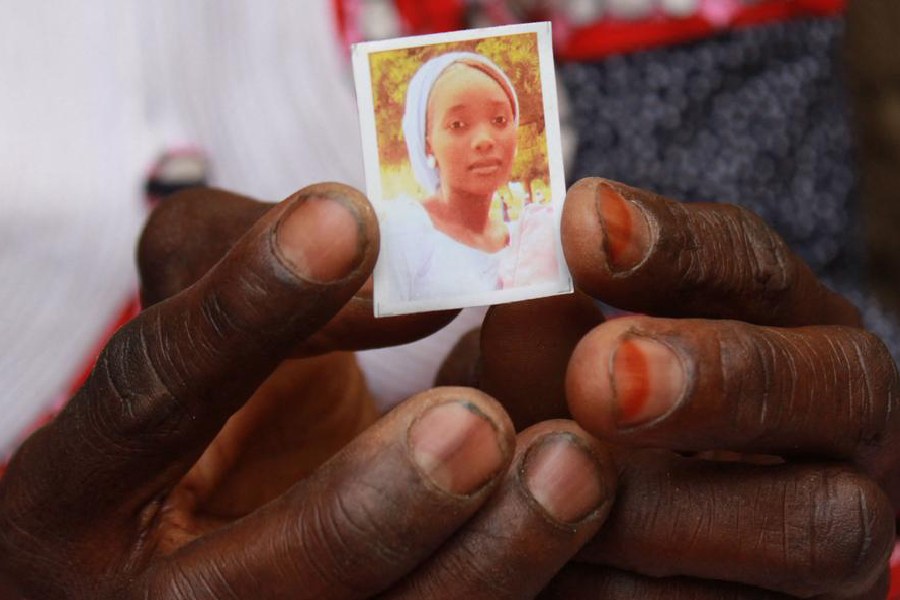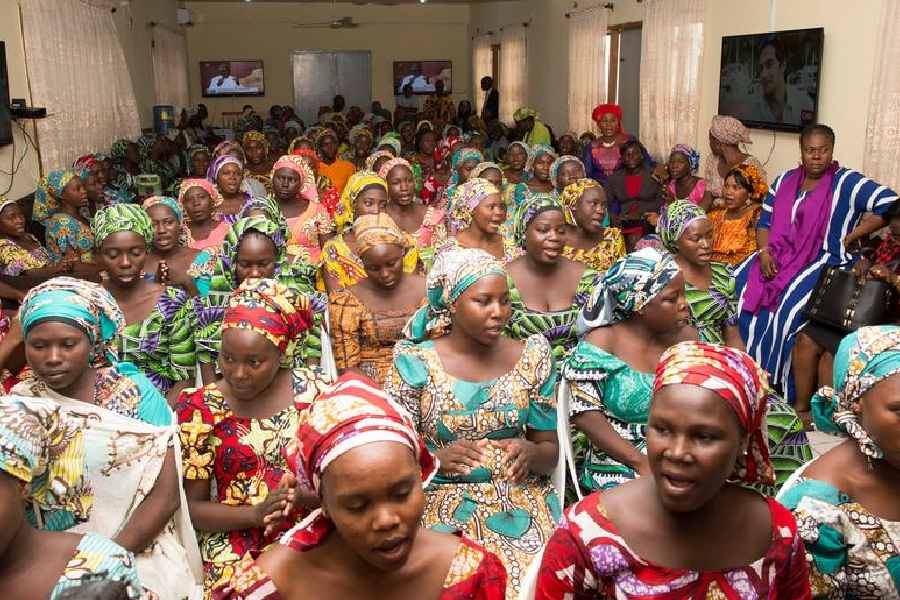During the night of April 14, 2014, dozens of fighters from the Boko Haram Islamist militant group stormed a school dormitory for girls in the remote town of Chibok, a small Christian enclave in the majority-Muslim north of Nigeria.
The 276 schoolgirls, mostly aged between 16 and 18, were herded at gunpoint through the forest to waiting trucks after the militants set fire to the school buildings.
Within hours of the abductions, 57 girls managed to escape. Some hid in the bushes, while others jumped out as they drove through the dark night of the Sambisa Forest that had become Boko Haram's hideout.
One of those who managed to escape told Human Rights Watch that an insurgent asked the schoolgirls in the truck: "What kind of knowledge are you looking for here [at the school]? Since you are here to look for Western education, we are here to confront it and teach you the ways of Islam."
The name of the militant group, Boko Haram, is usually translated as "Western education is forbidden."
Why was it so easy to kidnap the girls?
Attacks by Boko Haram had already caused mass closures of schools in region, including Chibok's Government Girls Secondary School in March that year. The militant group started an armed rebellion against Nigeria's government in 2009, wanting to carve out an Islamic state. It was known for its hostility to non-Quranic education.
But the government-run school in Chibok opened specially for students who were taking their WAEC, or final exams. Many girls had traveled to the school from surrounding villages, where schools remained shuttered.
Despite Borno State being under emergency rule, no soldiers were stationed at the school and the two watchmen guarding the compound fled as the fighters approached.
Another group of Boko Haram militants fired on the 17 security forces based in the town center, who were overwhelmed and retreated into the forest.
Panicked villagers who saw the Boko Haram convoy roll through their communities on their way to Chibok also called the military base in Borno State's capital, Maiduguri, several hours before the assault, according to investigations by Amnesty International and others. But the military was unable to muster troops to travel the 125 kilometers (78 miles) to Chibok, allowing Boko Haram to snatch the unprotected girls.
What happened to the girls?
Dozens of the girls escaped shortly after they were captured, after which the group's leader, Abubakar Shekau, threatened to sell the remaining girls off as slaves.
Many of those held by Boko Haram were forced to convert to Islam if they were Christian, marry their captors and bear them children. They were often married several times as one husband after another was killed in clashes.
Little was heard of the girls in the following years, with two girls found between May and September 2016. But then came several mass releases, brokered by the International Red Cross and the Swiss government, reportedly as part of a prisoner swap.

The mother of one of the abducted Chibok girls holds a picture of her daughter, Kabu Mala, in 2019 Deutsche Welle
More than 100 girls have since been freed. Accounts from those who have returned talk of beatings, perpetual hunger and worse. They were held mostly in camp huts hidden in the Sambisa Forest.
"The place I was held captive was very bad. It is something we never expected. We suffered there. We were hungry," Chibok survivor Mary Dauda told Amnesty International.
Some 82 of the abuctees are still unaccounted for.
What role did #BringBackOurGirls play?
The government of Nigeria's then-President Goodluck Jonathan was slow to admit that the kidnappings had taken place and sluggish to try to rescue the girls.
But then a group of Nigerians launched the Twitter campaign #BringBackOurGirls. Shared by celebrities such as the Hollywood actor Angelina Jolie and former US first lady Michelle Obama, it exploded on social media, sparking global outrage.
The social media campaign also triggered physical protests in Nigeria and elsewhere. In turn, these stirred Jonathan to promise to find the girls and the police to post a reward of $300,000 (€218,865 at the time). Then US President Barack Obama even sent a team of advisers to help Nigeria's military with the search, although Nigerian authorities were reluctant to accept international assistance.
Why do the Chibok abductions still resonate today?
Boko Haram attacked some 50 schools in the year before the Chibok raid and kidnapped dozens of children.
But several factors make the abduction of the Chibok girls a continued focus of attention 10 years later.
Chibok signaled the beginning of large-scale abductions in Nigeria, something that is still happening today — although a wider number of players are involved in kidnappings.
In early March, nearly 300 children were abducted from a school in Kuriga in Nigeria's northwest, many of whom were later freed. A few days beforehand, 200 people, mostly women and children were kidnapped in Borno State.
Additionally, the listless response by authorities to the kidnappings of the Chibok girls has turned it into an infamous example of the federal government's failure to protect people then, and now.
Schoolchildren especially are bearing the brunt. More than 1,680 children were kidnapped from April 2014 until mid-2023, according to the aid organization Save the Children.
Nearly 100 schools in Katsina state alone were closed due to insecurity in 2023. And fear of kidnapping is a major motivation for Nigeria's children to stay out of school.










